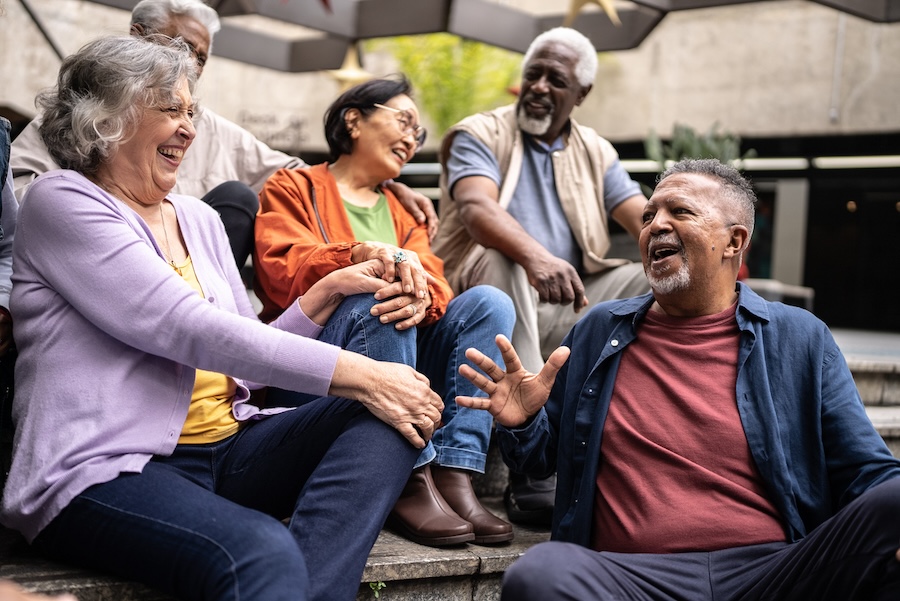Dr. Kate Mulligan is the Senior Director of the Canadian Institute for Social Prescribing (CISP), a new national hub created to support health care providers and social services professionals to connect people to non-clinical supports and community resources. She is also an assistant professor in social and behavioural health sciences in the Dalla Lana School of Public Health at the University of Toronto. Mulligan is recognized globally as an expert in bringing a community-focused approach to health, and led one of Canada’s first social prescribing projects. Kate Mulligan spoke with Kate Spencer.
Kate Spencer: How do you define “social prescribing”?
You may unsubscribe from any of our newsletters at any time.
Kate Mulligan: The basic idea is that people can receive supported referrals to non-clinical supports and services. They have a conversation with someone with expertise [like a doctor] to determine a plan, and get support to follow through on something non-clinical that benefits their health. It should be happening systematically, as a regular part of our health system. We know at the big population level that social determinants are important to health. But now we can do it in a precise way for individual people and communities.
KS: Tell me some forms social prescribing could take.
KM: A very popular one is food prescribing. Someone experiencing food insecurity or an illness like diabetes can be prescribed fresh foods. That could mean a voucher for your local farmers’ market, a food box delivery to your home or a credit card that you can spend at the regular grocery store. Social prescribing also means making sure the provided food is culturally appropriate. And thinking about possible connections to include and benefit local farmers. It’s working on the community level.
More on Broadview:
KS: How do you evaluate whether social prescribing works? How is success defined and measured?
KM: There’s tons of evidence for the prescriptions. Time in nature is good for us. Exercise, healthy food, stable housing: there’s research and studies for all these types of things. There’s less evidence about the process of social prescribing because it’s new. We encourage people to build evaluation into their project, though that can challenge some small community groups. The practice is coming along quickly in Canada and the research is not far behind. One example I often reference was a small community largely inhabited by retirees — lots of people ending up living alone without a strong support network — where a community health centre implemented social prescribing. An older man was diagnosed with depression after his wife died. He kept going for primary care, but really what he was experiencing was unsupported grief. Through social prescribing, he was connected with a fishing rod and a fishing buddy. This is like a $20 intervention. Within a fairly short time, he got off his medication and reconnected with other services too — built friendships, got connected to other community offerings. The health centre started developing their own services, like grief support cooking classes for older grieving widows.
KS: What are some challenges you’ve encountered in implementing social prescribing across Canada?
KM: People don’t know how to get started. Often, you’re simply taking the next step from where you are. If you’re in a primary care setting, you might use the time of one of your fellow healthcare providers to take this approach. If you’re inside a community organization, you might consider how to measure services in terms of people’s health. There is also concern that this overmedicalizes our social lives, or cause health systems to roll over communities and cause more harm. You might tell an Indigenous person to go visit a park as an easy way to spend time in nature, but if there’s a big colonial history in how that park came to be it might not be healthy. You need an equity lens and real connection to community to avoid causing harm.
KS: What role does CISP play?
KM: Our role is to be a catalyst for system change across Canada, helping communities share expertise across provinces, ensuring philanthropic and government bodies are interested and funding these projects on a scale above local intervention. And making sure we measure and support what’s already happening, like caregivers in homes — people looking after aging parents for example — if you took away their labour, the whole system would collapse. We have a big project coming up to do evaluation and create an approach to help caregivers connect to resources. When caregivers are sandwiched between children and aging parents, there’s little time to prioritize themselves, but we listen to the advice of people we trust, whether it’s a community health worker or healthcare provider or elder or person in their same cultural community. Whoever they trust, that’s who we want to connect with.
KS: What do you hope for the future of social prescribing in Canada?
KM: That the community sector is fully recognized as part of our health system. Social prescribing is a tool for helping that to happen but it’s not an end unto itself. The idea is it helps us to measure, demonstrate and connect the work that’s been going on all along on the community scale. Fund it appropriately and include it and value the inclusion and belonging as valid and important indicators of our health and wellbeing. Before the pandemic might have been a tougher sell, but now people understand it better — we need a sense of collective resilience.
This interview has been condensed and edited for clarity and length.
***
Kate Spencer is a writer in Halifax.













